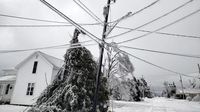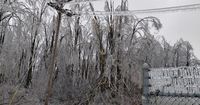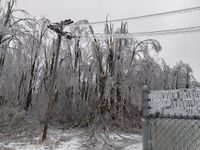In the wake of a devastating ice storm that swept through Northern Michigan over the weekend, residents are grappling with widespread power outages and impassable roads. The storm, which occurred from March 29-30, 2025, has left thousands without electricity, and recovery efforts are ongoing as utility companies work to restore power to affected areas.
Power companies estimate that it could take several days before electricity is fully restored to those impacted by the storm. As of March 31, 2025, Consumers Energy reported 3,764 outages affecting approximately 160,495 customers statewide. The company has managed to restore power to 75,000 customers over the past two days, but many areas remain in the dark.
"We understand how frustrating it is to be without power and we thank customers for their patience as our crews continue working around the clock to get the power restored," said Chris Fultz of Consumers Energy in a statement. "Crews from four states joined with our crews as they encountered uprooted trees, down lines, and broken poles." Officials believe that the majority of Northern Michigan's restoration efforts will be completed by April 1, 2025, with the hardest-hit areas expected to be back online by April 2.
Great Lakes Energy also faced significant challenges, reporting 422 outages affecting 45,301 customers across 15 of the cooperative’s 26 counties. The widespread damage to trees and electric infrastructure has slowed progress, as many roads remain blocked by fallen trees and power lines. "Replacing poles — a process that takes several hours — along with repairing downed wires and clearing fallen trees, is contributing to the extended restoration timeline," the company noted in a release.
Meanwhile, Presque Isle Electric and Gas Co-Op reported that 32,233 customers were without power as of March 31. The company’s President and CEO, Allan Berg, described the situation as unprecedented, stating, "This storm is unlike anything we have experienced. While we diligently prepare for any weather event, this event is extreme. It only takes a quarter of an inch of ice to cause damage, and we have areas with over half an inch of ice or more. The lines can fall when this happens, which causes further damage and outages." Berg urged customers to seek alternative shelter and plan accordingly as restoration efforts could extend for several days.
In response to the crisis, Michigan Governor Gretchen Whitmer declared a state of emergency for ten counties in Northern Lower Michigan and the Upper Peninsula. The counties affected include Otsego, Oscoda, Montmorency, Presque Isle, Emmet, Charlevoix, Cheboygan, Crawford, Mackinac, and Alpena. Whitmer emphasized the need for swift action to support residents, stating, "This morning, I’m declaring a state of emergency to get help out the door as fast as possible for Michiganders hit by the ice storm. Yesterday, I activated our State Emergency Operations Center to coordinate our response. State and local emergency teams are already on the ground, and we will continue collaborating with local first responders, too. I want to thank everyone working hard to keep people safe. We will get through this together."
The emergency declaration allows the Michigan State Police and its Emergency Management and Homeland Security Division to coordinate state efforts and provide necessary resources for recovery. The Michigan State Police reported that many roads remained impassable north of M-52, and Interstate 75 was closed in Gaylord due to downed wires until it reopened around 2 p.m. on March 31.
As the storm's aftermath continues to unfold, Michigan Attorney General Dana Nessel has issued a warning to residents regarding potential scams that may arise during the recovery process. "After a weekend of severe weather, falling victim to a scam may be the last thing on your mind, but fraudsters often know that and try to take advantage," Nessel cautioned. She urged residents to be cautious when hiring contractors or making donations during this challenging time.
In addition to the power outages, the Mackinac Bridge was closed to traffic for part of March 31 due to falling ice, adding another layer of disruption for residents and travelers in the region. The bridge's closure was a precautionary measure to ensure safety as crews worked to clear the area.
In the city of Petoskey, the situation remained dire, with total power loss reported as of 9:30 a.m. on March 31. The first outage occurred around 8 p.m. on March 29, impacting approximately 50% of the city and its associated electrical service area. A second substation failure at around 8:30 a.m. on March 30 resulted in complete power loss for the city. City officials have yet to provide an estimate for when power may be restored.
As Northern Michigan continues to recover from this unprecedented ice storm, local officials and utility companies are working tirelessly to restore power and ensure the safety of residents. The community's resilience is being tested, but with state support and the efforts of dedicated crews, there is hope for a swift recovery.







